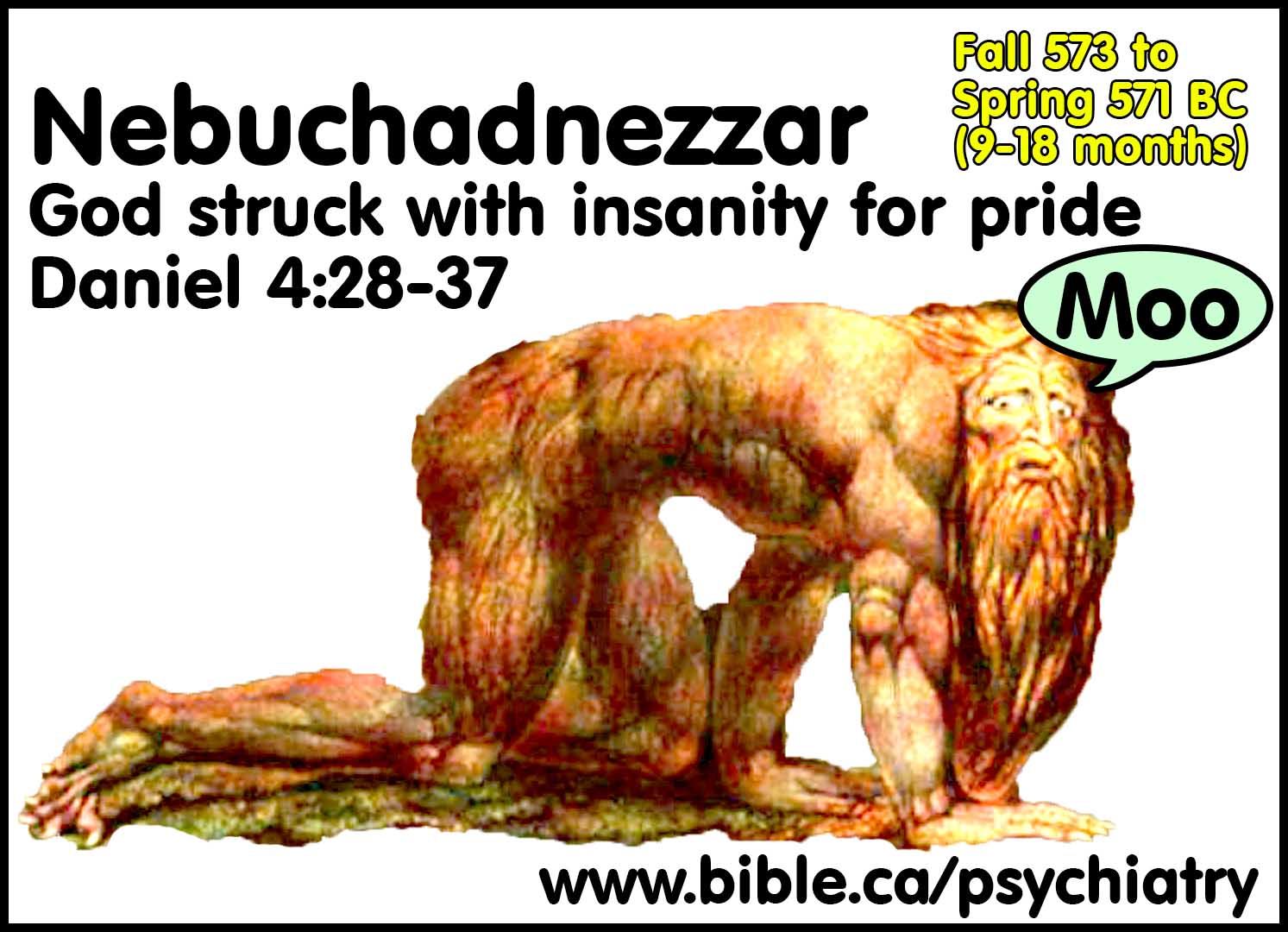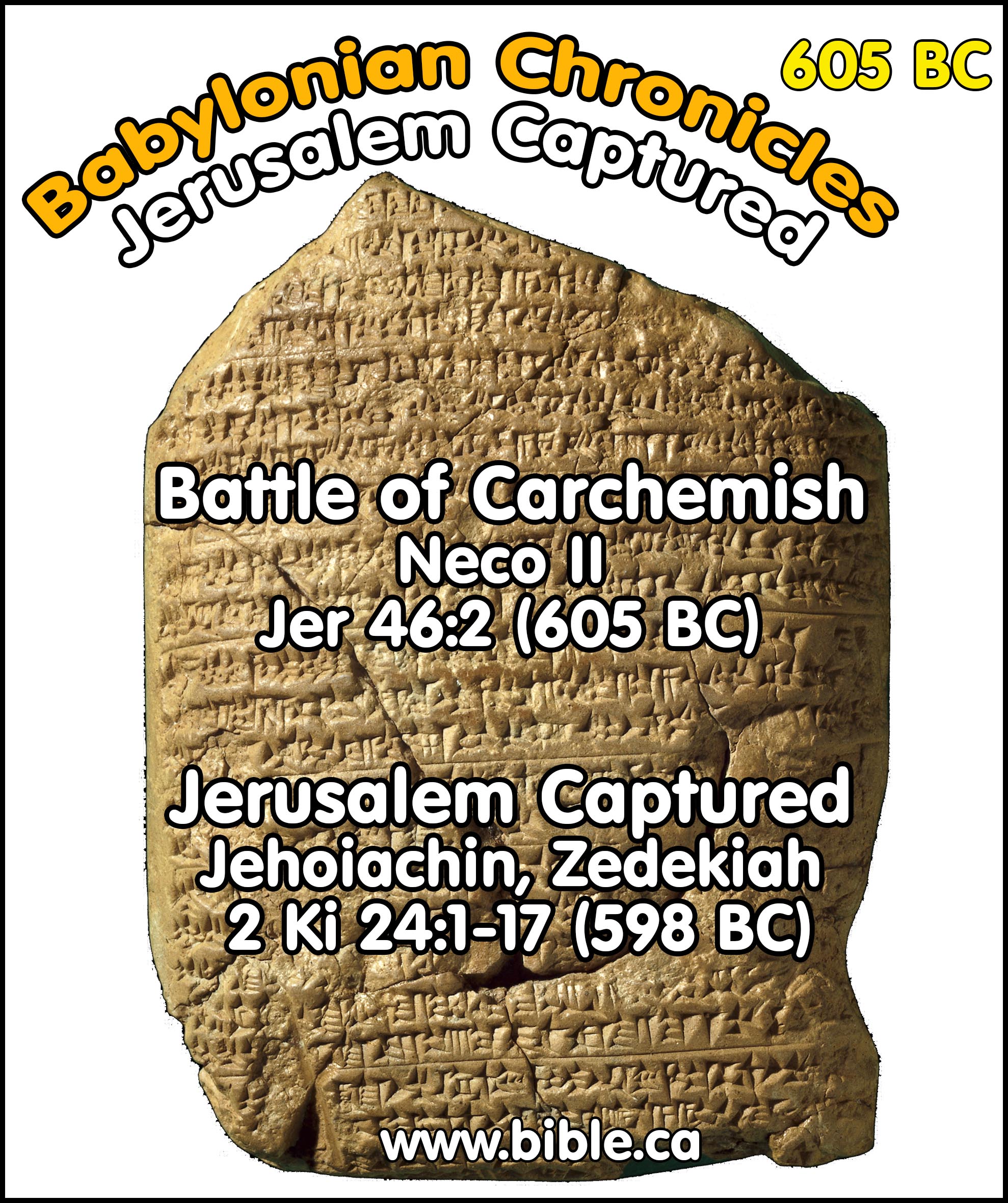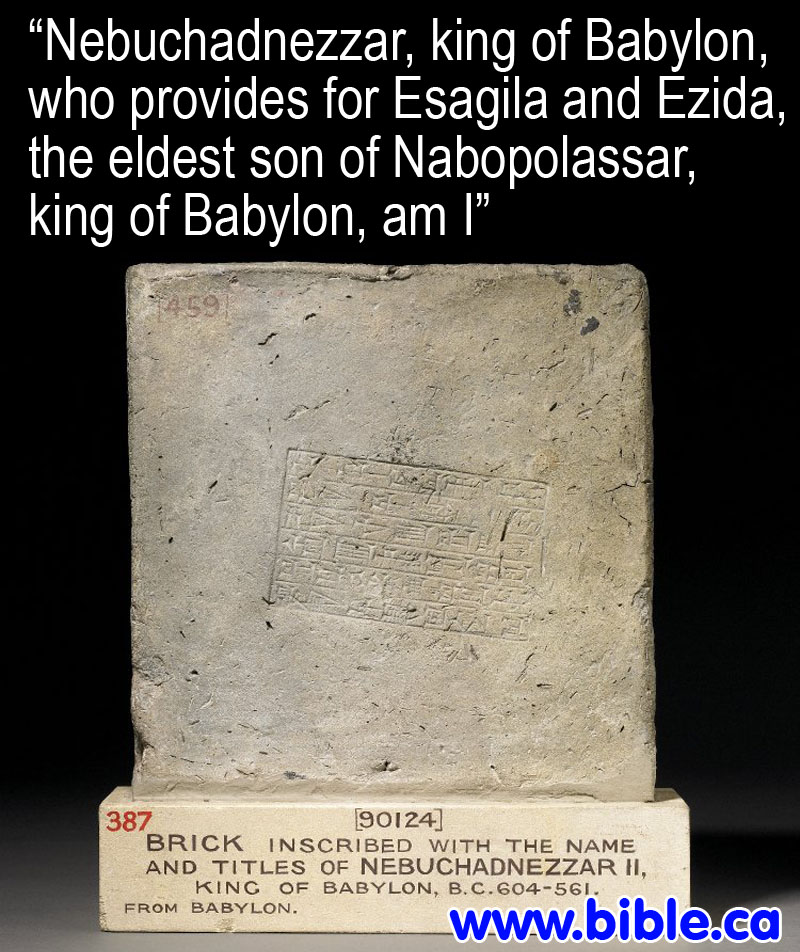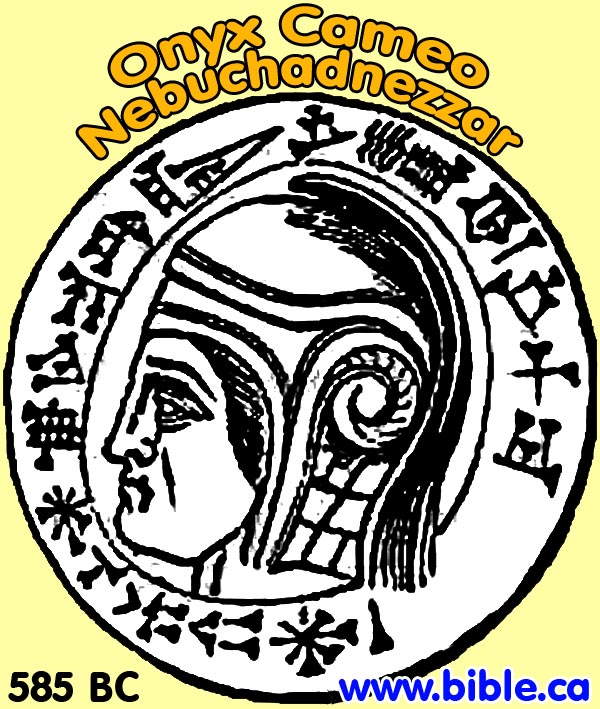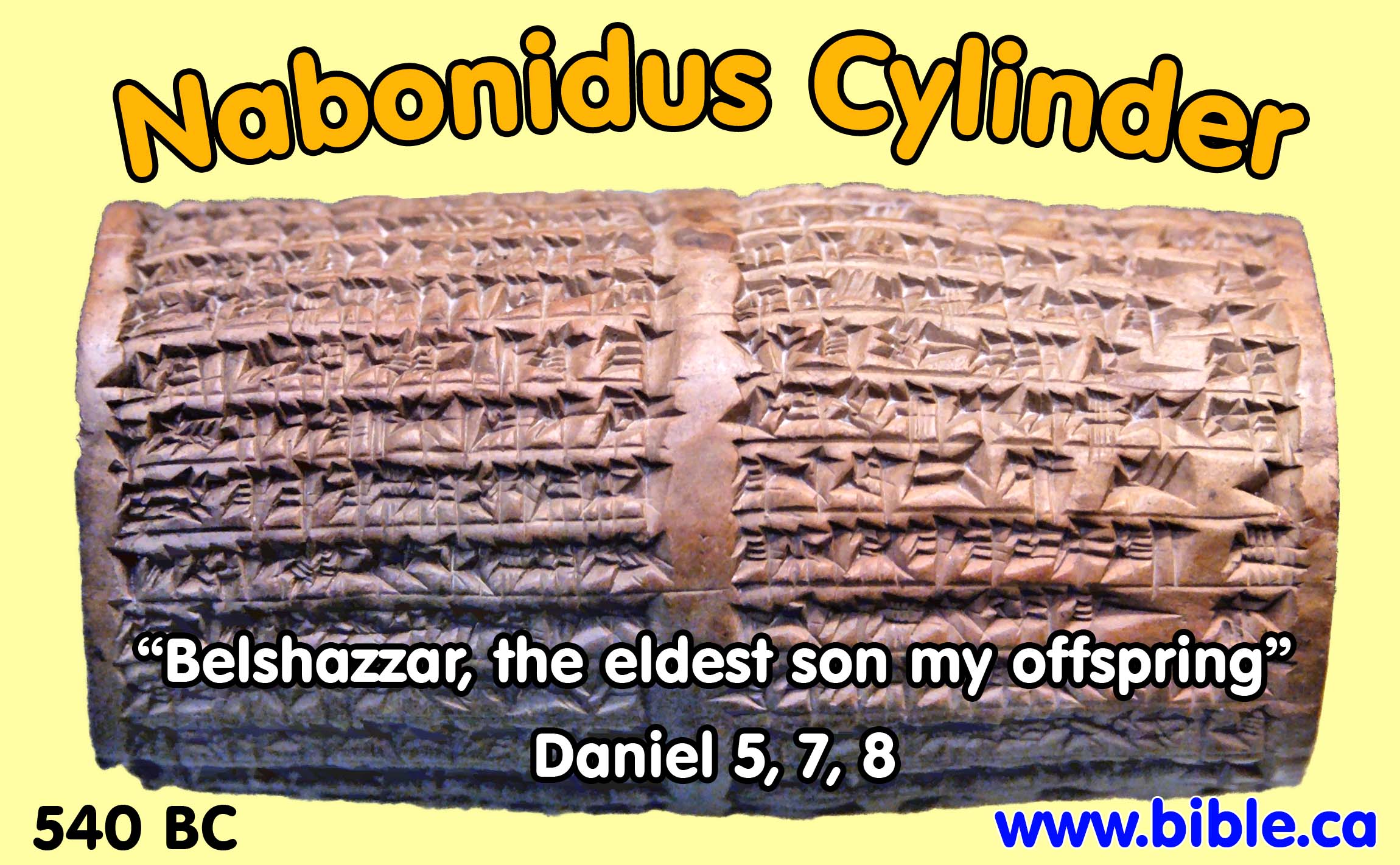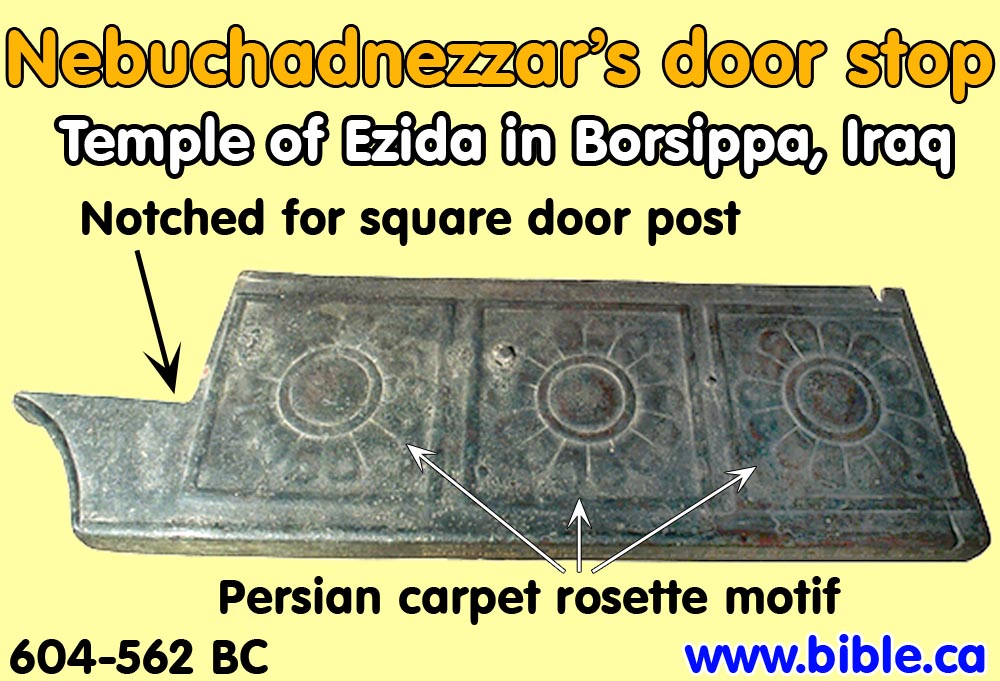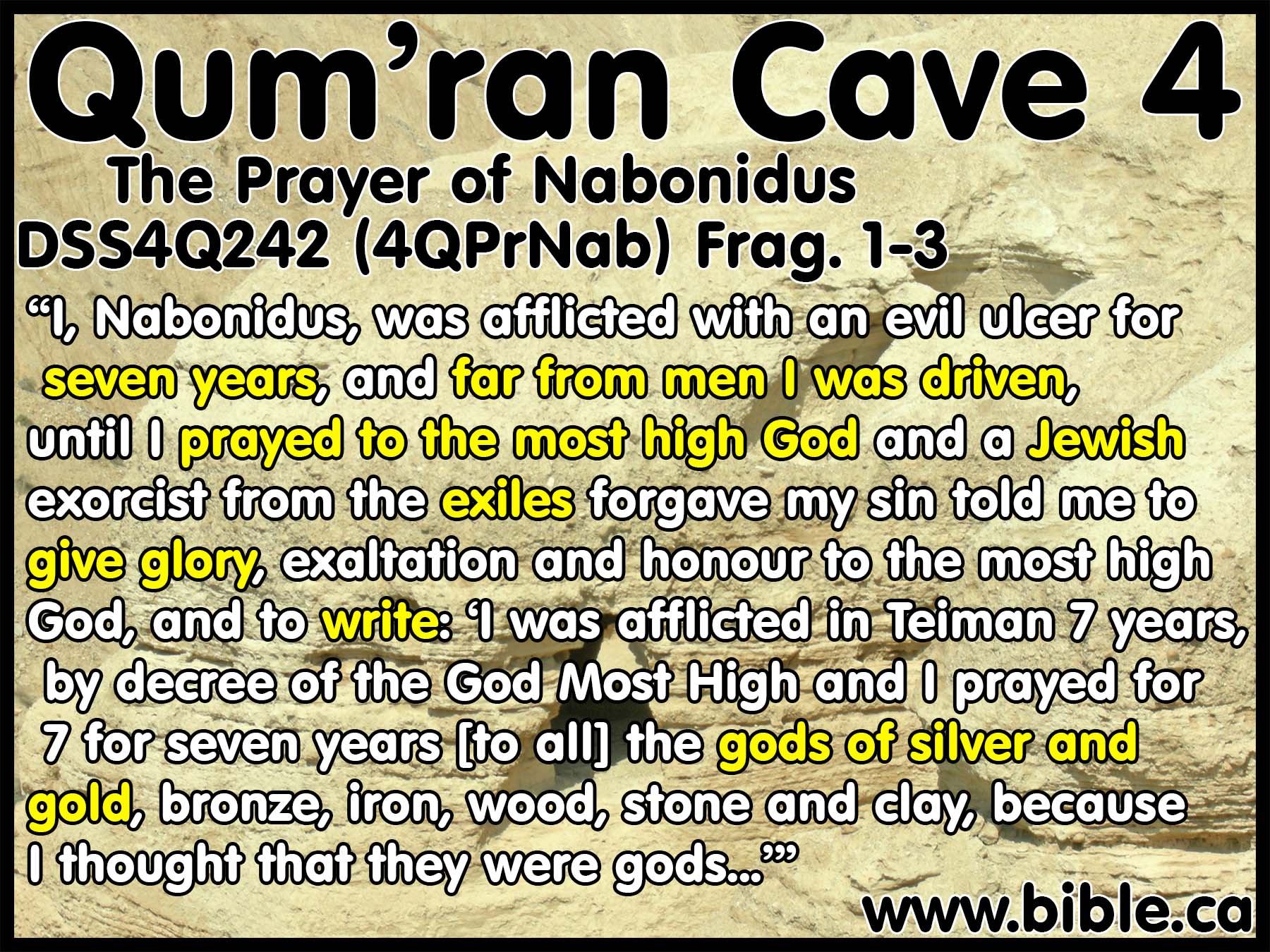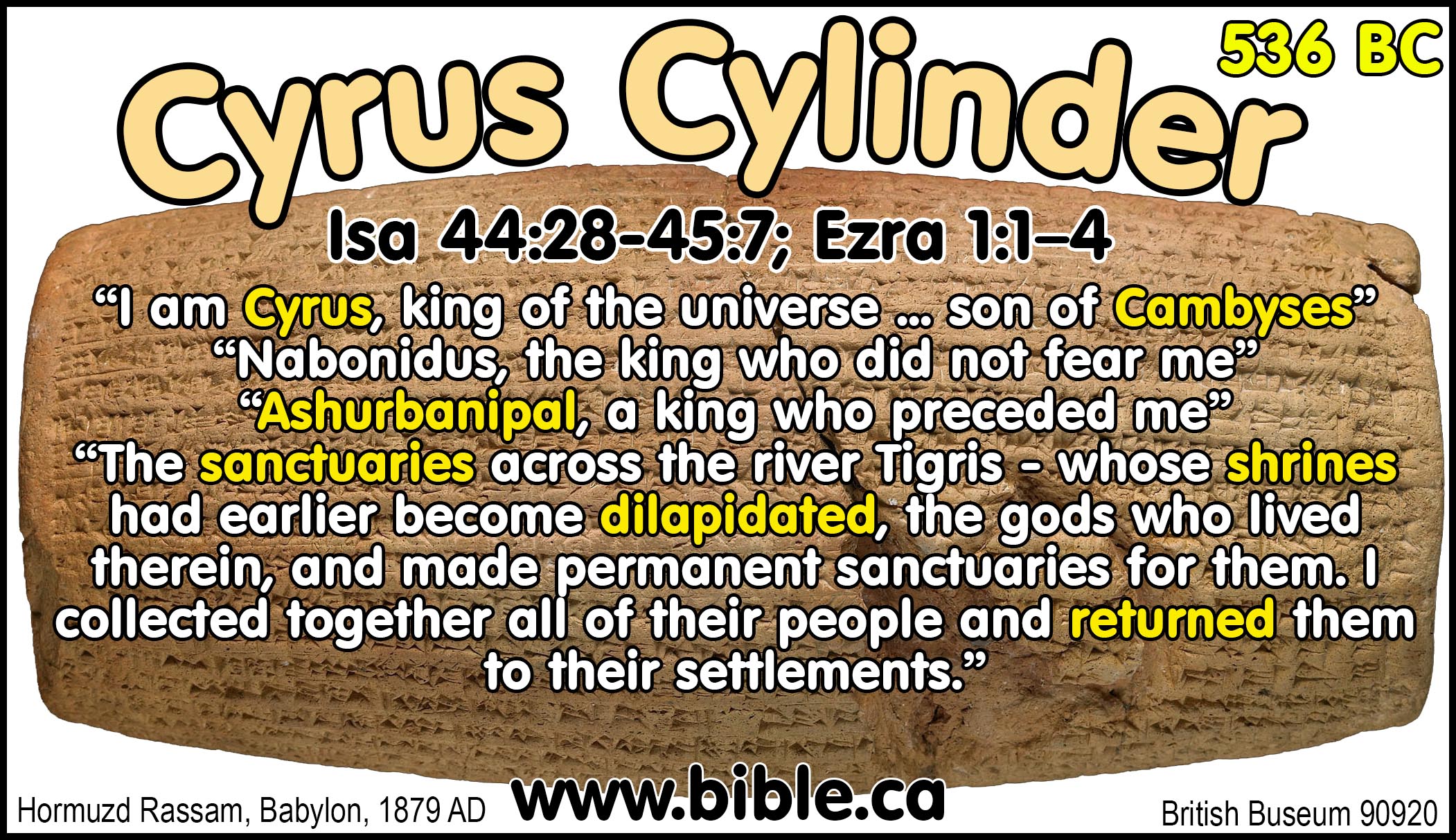|
|
Mental Illness in the Bible Nebuchadnezzar: Prideful king who went mad |
Nebuchadnezzar: The Prideful king who went mad
Daniel 4
Deuteronomy 28:27-29; Jeremiah 25:16
“The Lord will smite you with madness and with blindness and with bewilderment of heart; and you will grope at noon, as the blind man gropes in darkness, and you will not prosper in your ways; but you shall only be oppressed and robbed continually, with none to save you.” (Deuteronomy 28:27–29)
“They will drink and stagger and go mad because of the sword that I will send among them.” (Jeremiah 25:16)
Introduction:
A. The Names and the Babylonian/Chaldean dynasty
Note: Bel or Marduk, was the pagan God: Jeremiah 50:2
1. Founder: King Nabopolassar, ‘O Nabű, preserve the heir!’ (founder of dynasty)
2. Nebuchadnezzar (Son of Nabopolassar) means: “Nebo, protect the boundary or crown,” Nebo was son of King Nabopolassar, who was renamed Nebuchadnezzar by his father.
3. Daniel was named Belteshazzar which means: “Bel, protect his life.” Dan 1:7; 2:26; 4:8; 5:12.
4. Belshazzar means: “Bel [Marduk] will protect”, (Called son but grand Son in law to Nebuchadnezzar?) "Jesus son of David, son of Abraham" Matthew 1:1
5. Nebuchadnezzar named his son and Daniel after his pagan God Marduk (Bel)!
|
Babylonian Kings |
Reign BC |
Relation |
Meaning and definition of Babylonian name |
|
Nabopolassar |
626- 605 |
Father |
Nabopolassar: "May Nebo protect the son" |
|
Nebuchadnezzar |
605-562 |
Son of Nabopolassar |
Nebuchadnezzar: "O Nebo, defend the landmark" |
|
Evil-Merodach |
562-560 |
Son Nebuchadnezzar |
Evil-Merodach: "Man of Marduk (Bel)" |
|
Nergal-Sharezer |
560-556 |
Nebuchadnezzar’s son-in-law; Evil-Merodach’s brother in law |
Nergal-Sharezer: O Nergal, defend the king |
|
Labashi-Marduk |
556 |
Son of Nergal-Sharezer |
Labashi-Marduk: "? Marduk (Bel)" |
|
Nabonidus |
556-539 |
Assumed to be related by marriage to Nebuchadnezzar through mother or grandmother. |
Nabonidus: "Nebo is exalted" |
|
Belshazzar
|
553-539 |
Son of Nabonidus Second under Nabonidus his father: Daniel offered 3rd place: Dan 5:29) |
Belshazzar: "Bel (Marduk) protect the king" |
|
Nebuzaradan |
605-586 |
Nebuchadnezzar's army general in Jerusalem in 587 BC. |
Nebuzaradan: "Nebo has given a seed" |
|
Belteshazzar (Daniel) |
605-536 |
Prophet in Babylon, Persia |
Belteshazzar (Daniel): "Bel (Marduk) guard his life” |
B. Time Chronology/Overview of book:
1. Daniel becomes a prophet and king like Jesus. Both Jesus and Daniel were 2nd in command: Ch 1
2. King Nebuchadnezzar’s vision of statue were he is the head of gold: Ch 2-3
3. King Nebuchadnezzar’s vision of the tree that was cut down, he becomes cow: Ch 4
4. Daniel’s vision of four beasts to King Belshazzar’s (1st year of reign) Ch 7
5. Daniel’s vision of Ram and Goat to King Belshazzar (3rd year of reign) Ch 8
6. Handwriting on the wall: Death of King Belshazzar Ch 5
C. Nebuchadnezzar’s record of actions in the Bible:
1. Nebuchadnezzar carried Judah into Babylonian captivity: 2 Kings 25:1
2. "They slaughtered the sons of Zedekiah before his eyes, then put out the eyes of Zedekiah and bound him with bronze fetters and brought him to Babylon." 2 Kings 25:7
3. Mentioned by name 37 times in Jeremiah, but only 3 times in Daniel!
4. "May the Lord make you like Zedekiah and like Ahab, whom the king of Babylon roasted in the fire," Jeremiah 29:22 (Shadrach, Meshach and Abed-nego: Dan 3:20)
5. Three strikes and you're out! Twice Nebuchadnezzar exalted YHWH as God!
a) Interpretation of statue vision: "The king answered Daniel and said, “Surely your God is a God of gods and a Lord of kings and a revealer of mysteries, since you have been able to reveal this mystery.” Daniel 2:47
b) Furnace of Fire : Shadrach, Meshach and Abed-nego: “Therefore I make a decree that any people, nation or tongue that speaks anything offensive against the God of Shadrach, Meshach and Abed-nego shall be torn limb from limb and their houses reduced to a rubbish heap, inasmuch as there is no other god who is able to deliver in this way.” Daniel 3:29
c) Vision of tree being cut down: Warned to repent or else become a cow!
D. Archeology digs up another Bible story!
|
|
|||||
|
Babylonian Chronicle for 605–595 BC 2 Ki 24:1-17; 25:1-30; 2 Chron 36:1-21; Dan 1:1-6; Jer 36:9; 46:1-12; 52:1-34 1. The tablet describes events shortly after the capture of Nineveh and the fall of the Assyrian empire in 612 BC. 2. Nebuchadnezzar’s defeats Pharaoh Neco II at Carchemish in 605 BC while he was still crown prince. (Jeremiah 46:2) 3. Note: In 609 BC, there was a previous battle at Carchemish between Josiah, Neco II and Nebuchadnezzar where Neco II killed Josiah before the battle of Carchemish at Megiddo. That battle is not mentioned in this tablet. (2 Ki 23:29-30; 2 Chron 35:20-27). 4. When Nebuchadnezzar learned his father Nabopolassar had died on the eighth of Ab (15 August 605 BC) he returned to Babylon to become king on the first of Elul (7 September 605 BC).
|
|||||
|
Note: Regnal month for Babylon is Nissan and accession reckoning is used in the cuneiform tablet. Daniel used accession reckoning whereas Jeremiah used non-accession reckoning as indicated in square brackets.
Translation (Obverse) lines 1-20 1. In the twenty-first year [spring 605 BC] the king [Nabopolassar] of Akkad [Babylon] stayed in his own land, Nebuchadnezzar his eldest son, the crown-prince, 2. mustered the Babylonian army and took command of his troops [1st Campaign spring 605 - Aug 605]; he marched to Karchemiš [Carchemish] which is on the bank of the Euphrates, 3. and crossed the river to go against the Egyptian army [Pharaoh Neco II] which lay in Karchemiš. 4. They fought with each other and the Egyptian army withdrew before him. 5. He accomplished their defeat and beat them to non-existence. As for the rest of the Egyptian army 6. which had escaped from the defeat so quickly that no weapon had reached them, in the district of Hamath 7. the Babylonian troops overtook and defeated them so that not a single man escaped to his own country. 8. At that time Nebuchadnezzar conquered the whole area of Hamath. [Jehoiakim included] 9. For twenty-one years [22 years using Jeremiah's non-accession reckoning] Nabopolassar had been king of Babylon, 10. when on 8 Abu [15 August 605 BC] he went to his destiny; in the month of Ululu Nebuchadnezzar returned to Babylon 11. and on 1 Ululu [7 September 605 BC] he sat on the royal throne in Babylon. 12. In the accession year [7 Sept 605-Tishri 605, Year 1 using Jeremiah's non-accession reckoning] Nebuchadnezzar went back again 2nd Campaign Oct 605-Feb 604] [Oct 605 BC] to the Hatti-land [Syria, Israel] and until the month of Šabatu [January/Feb 604] 13. marched unopposed through the Hatti-land; in the month of Šabatu [January/Feb 604] he took the heavy tribute of the Hatti-territory to Babylon. 14. In the month of Nisannu [March 604] he took the hands of Bęl and the son of Bęl and celebrated the Akitu festival. 15. In the first year of Nebuchadnezzar [Year 2 Jeremiah's using non-accession reckoning: Nissan] in the month of Simanu [May 604] he mustered his army [3rd Campaign May 604-Feb 603] 16. and went to the Hatti-territory, he marched about unopposed in the Hatti-territory until the month of Kislîmu [Nov 604]. 17. All the kings of the Hatti-land came before him and he received their heavy tribute. 18. He marched to the city of Aškelon and captured it in the month of Kislîmu [Nov 604]. 19. He captured its king and plundered it and carried off spoil from it. 20. He turned the city into a mound and heaps of ruins and then in the month of Šabatu [Feb 603] he marched back to Babylon.
Translation (Reverse) Several lines missing: Second year campaign lines damaged and missing: [4th Campaign May 603-Feb 602] [Year 3 using Jeremiah's non-accession reckoning] 1'. In the third year [Year 4 using Jeremiah's non-accession reckoning] the king of Akkad [Babylon] left [5th Campaign Nov 602-Feb 601] and 2'. in the month of [...] on the thirteenth day, [the king's brother] Nabű-šuma-lišir [...] 3'. The king of Akkad mustered his troops and marched to the Hatti-land. 4'. and brought back much spoils from the Hatti-land into Akkad [Babylon]. 5'. In the fourth year [Year 5 using Jeremiah's non-accession reckoning] the king of Akkad mustered his army [6th Campaign Nov 601-Feb 600] and marched to the Hatti-land. In the Hatti-land they marched unopposed. 6'. In the month of Kislîmu [November] he took the lead of his army and marched to Egypt. The king of Egypt [Pharaoh Neco II] heard it and mustered his army. 7'. In open battle they smote the breast of each other and inflicted great havoc on each other. The king of Akkad turned back with his troops and returned to Babylon. 8'. In the fifth year [Year 6 using Jeremiah's non-accession reckoning] the king of Akkad stayed in his own land [No Campaign Nov 600-Feb 599]and gathered together his chariots and horses in great numbers. 9'. In the sixth year [Year 7 using Jeremiah's non-accession reckoning] in the month of Kislîmu [November] the king of Akkad mustered his army [7th Campaign Nov 599-Feb 598] and marched to the Hatti-land. From the Hatti-land he sent out his companies, 10'. and scouring the desert they took much plunder from the Arabs, their possessions, animals and gods. In the month of Addaru [Feb/March] the king returned to his own land. 11'. In the seventh year [Year 8 using Jeremiah's non-accession reckoning], the month of Kislîmu [November], the king of Akkad mustered his troops, marched to the Hatti-land, [8th Campaign Nov 598 -Feb 597] 12'. and besieged the city of Judah [Jerusalem] and on the second day of the month of Addaru [February/March] he seized the city and captured the king [Jehoiakim and Jeconiah]. 13'. He appointed there a king of his own choice [Zedekiah], received its heavy tribute and sent to Babylon. 14'. In the eight year [Year 9 using Jeremiah's non-accession reckoning], the month of Tebetu [Dec/January] the king of Akkad marched [9th Campaign Dec 597 -Feb 596] to the Hatti-land as far as Karchemiš [... 15'. ...] in the month of Šabatu [Jan/Feb] the king returned to his own land. 16'. In the ninth year [Year 10 using Jeremiah's non-accession reckoning], the month of [...] the king of Akkad and his troops marched [10th Campaign Nov 596 -Feb 595] along the bank of the Tigris [...] 17'. the king of Elam [...] 18'. the king of Akkad [...] 19'. which is on the bank of the Tigris he pitched his camp. While there was still a distance of one day's march between them, 20'. the king of Elam was afraid and, panic falling on him, he returned to his own land. 21'. In the tenth year [Year 11 using Jeremiah's non-accession reckoning] the king of Akkad was in his own land; from the month of Kislîmu [Nov/Dec] to the month of Tebetu [Dec/Jan] there was rebellion in Akkad [Babylon]. [Rebellion: Nov 595 -Jan 594] 22'. With arms he slew many of his own army. His own hand captured his enemy. 23'. In the month of [...] he marched [11th Campaign Jan-March 594] to the Hatti-land, where kings and [...]-officials 24. came before him and he received their heavy tribute and then returned to Babylon. 25. In the eleventh year [Year 12 using Jeremiah's non-accession reckoning] in the month of Kislîmu [Nov/Dec], the king of Akkad mustered his troops and marched to the Hatti-land. [12th Campaign Nov 594-Feb 593]
Translations from: Assyrian and Babylonian Chronicles, A.K. Grayson, 1975 AD Mesopotamian Chronicles Jean-Jacques Glassner, 2004 AD |
|||||
|
|
|||||
|
Nebuchadnezzar's bricks no. 41a (605-562 BC)
Inscription: 1 {d}AG – ku-dúr-ri – URŮ 2 LUGAL ba-bi-lu{ki} 3 za-ni-nu é-sag-íla 4 ů é-zi-da IBILA 5 SAG.KAL šá {d}AG – IBILA – URŮ 6 LUGAL ba-bi-lu{ki} ana-ku
Translation: "Nebuchadnezzar, king of Babylon, who provides for Esagila and Ezida, the eldest son of Nabopolassar, king of Babylon, am I" |
|||||
|
|
|||||
|
Nebuchadnezzar's Onyx Cameo (585 BC) Museum of Florence, Italy
Inscription: “In honour of Merodach, his lord, Nebuchadnezzar, king of Babylon, in his lifetime had this made.” |
|||||
|
|
|||||
|
Nabonidus Cylinder mentions Belshazzar (540 BC) British Museum ME 91128, discovered in 1854 BC "Nabonidus’ Rebuilding of E-Lugal-Galga-Sisa, The Ziggurat Of Ur This inscription, recorded on several clay cylinders found at Ur in the remains of the ziggurat, is probably the last building inscription of Nabonidus. … The inscription refers to the original builders of the ziggurat, Ur-Nammu and his son Shulgi, the first two rulers of the third dynasty of Ur (reigned ca. 2112–2095 and ca. 2094–2047 BCE; cf. COS 2.138–139). Nabonidus indirectly quotes their foundation deposits which he allegedly discovered during the excavation of the ziggurat. … The prayer to Sîn which concludes the inscription mentions Belshazzar (Bēl-šar-uṣur), Nabonidus’ son and heir to the throne, who appears in many business and administrative transactions from his reign. All known copies of this inscription are written in Neo-Babylonian script." (COS 2.123B) |
|||||
|
Translation: Royal titulary (i.1–4) Nabonidus, king of Babylon, caretaker of Esagil and Ezida, worshiper of the great gods, I, Rebuilding of the ziggurat (i.5-ii.2) E-lugal-galga-sisa, the ziggurat of Egishnugal, which is in Ur, which Ur-Nammu, one of the kings who preceded me, had built but not completed (and) whose work his son Shulgi had completed, (for) in the inscriptions of Ur-Nammu and Shulgi his son I read that Ur-Nammu had built that ziggurat but not completed it (and that) Shulgi his son had completed its work, now that ziggurat had become old and on the ancient foundations which Ur-Nammu and Shulgi his son had built, that ziggurat, as in former times, with bitumen and baked bricks I repaired its damaged parts and for Sîn, the lord of the gods of heaven and the netherworld, the king of the gods, the ‘gods’ of the gods, who dwells in the great heavens, the lord of Egishnugal, which is in Ur, my lord, I built anew. Prayer to Sîn (ii.3–31) O Sîn, my lord ‘gods’, king of the gods of heaven and the netherworld, ‘gods’ of the gods, who dwells in the great heavens, when you joyfully enter that temple, may good recommendations for Esagil, Ezida, Egishnugal, the temples of your great godhead,3 be set on your lips, and instill reverence for your great godhead (in) the hearts of its people so that they do not sin against your great godhead. May their foundations be as firm as heaven. As for me, Nabonidus, king of Babylon, save me from sinning against your great godhead and grant me as a present a life of long days, and as for Belshazzar, the eldest son my offspring, instill reverence for your great godhead (in) his heart and may he not commit any cultic mistake, may he be sated with a life of plenitude. Text: I R, plate 68, no.1 (master copy); Langdon 1912:250–253; As-Siwani 1964; Berger 1973:355–359; Translations: Seux 1976:521; Beaulieu 1989:35–37, 61–62; Foster 1993 2:756.) (Context of Scripture, Paul-Alain Beaulieu, 2.123B, 2000 AD) |
|||||
|
|
|||||
|
Nebuchadnezzar's bronze door-slab (605-562 BC) Discovered in 1883 BC at the temple of Ezida in Borsippa, Iraq This object is a bronze protection and decoration from the lower steps leading into the temple of Ezida. It features a recess to accommodate a door-post and the iron works pattern resembles a Persian carpet with rosette motif. Evidence of reuse is indicated since the door slab being cut in two. If this is the case, this most likely happened in 268 BC by the Seleucid emperor Antiochus I who rebuilt the temple of Ezida. Inscription: "Nebuchadnezzar, king of Babylon, patron of Esagila and Ezida, eldest son of Nabopolassar, king of Babylons am I. For Nabu, the exalted lord who had lengthened the days of my life Ezida, his temple in Borsippa I have built anew." |
|||||
|
|
|||||
|
Nabonidus was stricken by God with madness too! The Prayer of Nabonidus (DDS, 4QprNab = 4Q242 Frags. 1–3) “have praised the gods of silver and gold, bronze and iron, wood and stone” is identical to Dan 5:23 Some say this is a mix up, error or changing of the madness of Nebuchadnezzar. We reject this and feel this is a true story. This means that two kings of Babylon, the first and last, went mad fulfilling Jer 25:16. |
|||||
|
While the book of Daniel (4) writes of the miraculous recovery of Nebuchadnezzar after an illness which lasted seven years, this interesting Aramaic composition tells a similar story about the last king of Babylon, Nabonidus. The principal difference between the two is that Nebuchadnezzar was cured by God Himself when he recognized His sovereignty, whereas a Jewish exorcist healed Nabonidus by teaching him the truth and forgiving his sins. J. T. Milik considers the work to be older than Daniel, but a late second or early first century bce. dating seems to be less adventurous (cf. ‘Pričre de Nabonide et autres écrits d’un cycle de Daniel’, RB 63 (1956), 407–11). Cf. also G. Vermes, Jesus the Jew, London, 1973, 67–8. Text of the 3 fragments of the Dead Sea Scroll:
The words of the prayer uttered by Nabunai king of the l[and of Ba]bylon, [the great] king, [when he was afflicted] with an evil ulcer in Teiman by decree of the [Most High God].
I was afflicted [with an evil ulcer] for seven years … and an exorcist pardoned my sins. He was a Jew from [among the children of the exile of Judah, and he said], ‘Recount this in writing to [glorify and exalt] the name of the [Most High God’. And I wrote this]
‘I was afflicted with an [evil] ulcer in Teiman [by decree of the Most High God]. For seven years [I] prayed to the gods of silver and gold, [bronze and iron], wood and stone and clay, because [I believed] that they were gods …’ (The Dead Sea scrolls in English, G. Vermes, 1995) |
|||||
|
|
|||||
|
"Since the gods of foreign lands made permanent sanctuaries which are now dilapidated, I returned the people to their lands and made provisions to rebuild" (paraphrase of lines 31-36) |
The Cyrus Cylinder: 536 BC Ezra 1:1-4; 2 Chro 36:22-23; Jer 31:38; 25:11, 12, 29:10 Cyrus: 539-530 BC. Discovered in 1879 AD in the ruins of Babylon and housed in the British Museum, the clay Cyrus Cylinder is an Akkadian cuneiform script and is considered the world’s first charter of human rights. Although the cylinder makes no mention of Jews, Israel or Jerusalem, it names Cyrus, his son Cambyses, Nabonidus, indirectly references Belshazzar and most importantly, it specifically decrees that Babylonian captives are provisioned and returned to their lands to rebuild their destroyed temples. |
||||
|
"The account in Ezra 1 represents the Jewish version promulgated in their communities at the time of the issuance of the decree. The Cyrus cylinder (ANET, p. 316) records similar acts of amnesty and favor shown to the peoples and deities of other countries following his conquest of Babylon in 538 b.c., which marked the first year of Cyrus’ hegemony over the Jews—not the first year of his reign as king of Persia (ca. 557 b.c.). The beneficent act of the king is linked to the prophecy of Jeremiah that Jerusalem will be rebuilt (Jer 31:38) and there will be a return from captivity after a sabbath of seventy years (25:11, 12, 29:10)" (Anchor Yale Bible, J. M. Myers, 2008 AD, Ezra 1:1)
Inscription: 1. [When ... Mar]duk, king of the whole of heaven and earth, the ....... who, in his ..., lays waste his....... 2. [........................................................................] broad? in intelligence, ...... who inspects (?) the wor]ld quarters (regions) 3. [..............................................................…] his [first]born (=Belshazzar), a low person, was put in charge of his country, 4. but [..................................................................................] he set [a (…) counter]feit over them. 5. He ma[de] a counterfeit of Esagil, [and .....….......]... for Ur and the rest of the cult-cities. 6. Rites inappropriate to them, [impure] fo[od-offerings ….......................................................] disrespectful […] were daily gabbled, and, as an insult, 7. he brought the daily offerings to a halt; he inter[fered with the rites and] instituted […....] within the sanctuaries. In his mind, reverential fear of Marduk, king of the gods, came to an end. 8. He did yet more evil to his city every day; … his [people ................…], he brought ruin on them all by a yoke without relief. 9. Enlil-of-the-gods became extremely angry at their complaints, and […] their territory. The gods who lived within them left their shrines, 10. angry that he had made (them) enter into Shuanna (Babylon). Ex[alted Marduk, Enlil-of-the-Go]ds, relented. He changed his mind about all the settlements whose sanctuaries were in ruins, 11. and the population of the land of Sumer and Akkad who had become like corpses, and took pity on them. He inspected and checked all the countries, 12. seeking for the upright king of his choice. He took the hand of Cyrus, king of the city of Anshan, and called him by his name, proclaiming him aloud for the kingship over all of everything. 13. He made the land of Guti and all the Median troops prostrate themselves at his feet, while he shepherded in justice and righteousness the black-headed people 14. whom he had put under his care. Marduk, the great lord, who nurtures his people, saw with pleasure his fine deeds and true heart, 15. and ordered that he should go to Babylon. He had him take the road to Tintir (Babylon), and, like a friend and companion, he walked at his side. 16. His vast troops whose number, like the water in a river, could not be counted, were marching fully-armed at his side. 17. He had him enter without fighting or battle right into Shuanna; he saved his city Babylon from hardship. He handed over to him Nabonidus, the king who did not fear him. 18. All the people of Tintir, of all Sumer and Akkad, nobles and governors, bowed down before him and kissed his feet, rejoicing over his kingship and their faces shone. 19. The lord through whose help all were rescued from death and who saved them all from distress and hardship, they blessed him sweetly and praised his name. 20. I am Cyrus, king of the universe, the great king, the powerful king, king of Babylon, king of Sumer and Akkad, king of the four quarters of the world, 21. son of Cambyses, the great king, king of the city of Anshan, grandson of Cyrus, the great king, ki[ng of the ci]ty of Anshan, descendant of Teispes, the great king, king of the city of Anshan, 22. the perpetual seed of kingship, whose reign Bel (Marduk)and Nabu love, and with whose kingship, to their joy, they concern themselves. When I went as harbinger of peace i[nt]o Babylon 23. I founded my sovereign residence within the palace amid celebration and rejoicing. Marduk, the great lord, bestowed on me as my destiny the great magnanimity of one who loves Babylon, and I every day sought him out in awe. 24. My vast troops were marching peaceably in Babylon, and the whole of [Sumer] and Akkad had nothing to fear. 25. I sought the safety of the city of Babylon and all its sanctuaries. As for the population of Babylon […, w]ho as if without div[ine intention] had endured a yoke not decreed for them, 26. I soothed their weariness; I freed them from their bonds(?). Marduk, the great lord, rejoiced at [my good] deeds, 27. and he pronounced a sweet blessing over me, Cyrus, the king who fears him, and over Cambyses, the son [my] issue, [and over] my all my troops, 28. that we might live happily in his presence, in well-being. At his exalted command, all kings who sit on thrones, 29. from every quarter, from the Upper Sea to the Lower Sea, those who inhabit [remote distric]ts (and) the kings of the land of Amurru who live in tents, all of them, 30. brought their weighty tribute into Shuanna, and kissed my feet. From [Shuanna] I sent back to their places to the city of Ashur and Susa, 31. Akkad, the land of Eshnunna, the city of Zamban, the city of Meturnu, Der, as far as the border of the land of Guti - the sanctuaries across the river Tigris - whose shrines had earlier become dilapidated, 32. the gods who lived therein, and made permanent sanctuaries for them. I collected together all of their people and returned them to their settlements, 33. and the gods of the land of Sumer and Akkad which Nabonidus – to the fury of the lord of the gods – had brought into Shuanna, at the command of Marduk, the great lord, 34. I returned them unharmed to their cells, in the sanctuaries that make them happy. May all the gods that I returned to their sanctuaries, 35. every day before Bel and Nabu, ask for a long life for me, and mention my good deeds, and say to Marduk, my lord, this: “Cyrus, the king who fears you, and Cambyses his son, 36. may they be the provisioners of our shrines until distant (?) days, and the population of Babylon call blessings on my kingship. I have enabled all the lands to live in peace.” 37. Every day I increased by [… ge]ese, two ducks and ten pigeons the [former offerings] of geese, ducks and pigeons. 38. I strove to strengthen the defences of the wall Imgur-Enlil, the great wall of Babylon, 39. and [I completed] the quay of baked brick on the bank of the moat which an earlier king had bu[ilt but not com]pleted its work. 40. [I …… which did not surround the city] outside, which no earlier king had built, his workforce, the levee [from his land, in/int]o Shuanna. 41. [… ......................................................................with bitum]en and baked brick I built anew, and [completed] its [work]. 42. […...........................................................] great [doors of cedar wood] with bronze cladding, 43. [and I installed] all their doors, threshold slabs and door fittings with copper parts. [….......................]. I saw within it an inscription of Ashurbanipal, a king who preceded me; 44. […................................................] in its place. May Marduk, the great lord, present to me as a gift a long life and the fullness of age, 45. [a secure throne and an enduring rei]gn, [and may I …... in] your heart forever.
Lines 1-2, and 44-45 are restored on the basis of two clay fragments from a Late Babylonian tablet, inscribed with text which duplicates that of the Cyrus Cylinder. (Translation from British Museum) |
|||||
|
|
|||||
II. Exposition of our text: Daniel 4
A. God said he would punish the king of Babylon with madness:
1. “I will punish the king of Babylon... For thus the Lord, the God of Israel, says to me, “Take this cup of the wine of wrath from My hand and cause all the nations to whom I send you to drink it. “They will drink and stagger and go mad because of the sword that I will send among them.” Jeremiah 25:12-16
B. Outline:
1. Notice the narration is by Nebuchadnezzar himself, first party.
2. v1-3 Praises God. This could be either conclusion to chapter 3 or intro to chapter 4. We believe it is an introduction to chapter 4.
3. v4-18 the dream of the tree being cut and his mind changing to an animal.
4. v19 shows Daniel’s genuine emotional reaction of concern. Daniel must have loved and respected the king.
5. v20-25 Daniel interprets the dream and applies it to Nebuchadnezzar.
6. v26 The king was guilty of pride, rejecting the fact that God placed him in his position of power. Nebuchadnezzar would have the mind of an animal until he repented!
7. v27 Daniel gives advice indicating that Nebuchadnezzar could repent and avoid all this. Just like Jonah’s decree of “40 days and Nineveh will be overthrown” was canceled by repentance, the same was true with Nebuchadnezzar if he heeded Daniel’s advice. Evidently the king rejected this advice. Notice that the kings pride caused him to treat those below him (the poor) without the very mercy he had the power to supply them. Caring for the poor “far below him” would be the proof of his new found humility!
8. v28 Now Daniel takes over the narrative from Nebuchadnezzar.
9. v29 “one year later” shows the longsuffering of God for man to repent (see 2 Pe 3:9)
10. v30 The king said two fatal things that sealed his fate both of which competed with God: “by my might and power” and “for my glory and majesty”. Perhaps this was just more than God could take any longer and, well, ZAP! Nebuchadnezzar became a cow!
11. v31-32 Nebuchadnezzar would be a cow, “until you recognize that the Most High is ruler over the realm of mankind and bestows it on whomever He wishes”. .
12. v33 The 7 periods of time are simply as long as it takes for Nebuchadnezzar to repent! The 7 periods were probably between 1-7 years, since it hair grows 6 inches per year, it takes 4 years to grow your hair to your waist. Fingernails grow at a rate of 1.5 inches per year... about the length of a bird claw! We take the view that the 7 periods of time were about a year.
13. Account from a clay tablet discovered in 2006 AD that reads: “One day Nebuchadnezzar was feeding beside the other cattle and by the words of his own mouth, God knew he had not yet learned the lesson of humility. A group of cows were eating at the choicest spot in the field and Nebuchadnezzar said to them, “I am the great Nebuchadnezzar, I should be eating at the best spot, not you lowly cows... MOOOOOVE out of my way!” When this happened, God knew it was going to take a while longer for Nebuchadnezzar to learn his lesson.” (relax, its just a Rudd original joke)
14. v34-36 Upon the condition being met that the king repented, only then was his reason returned to him. He started praising God as master of all!
15. v37 Now this pagan King’s long conversion to monotheism is complete in one of the most beautiful and heartfelt statements in the Bible: “Now I, Nebuchadnezzar, praise, exalt and honor the King of heaven, for all His works are true and His ways just, and He is able to humble those who walk in pride.” Daniel 4:37
16. Lesson learned and this is the last we hear of Nebuchadnezzar in both the Bible and in archeology. While we have much archeology on Nebuchadnezzar’s, we have nothing on the end of his life. Perhaps we will see him in heaven! These represent the last words of Nebuchadnezzar in either the Bible or antiquity from any source known! If only our last recorded words are as beautiful! What an epitaph!
III. The sins of Nebuchadnezzar:
A. Pride, which affected his ability to rule over those below him in a fair and just manner.
1. “Twelve months later he was walking on the roof of the royal palace of Babylon. “The king reflected and said, ‘Is this not Babylon the great, which I myself have built as a royal residence by the might of my power and for the glory of my majesty?’" Daniel 4:29-30
2. “But when his heart was lifted up and his spirit became so proud that he behaved arrogantly, he was deposed from his royal throne and his glory was taken away from him." Daniel 5:20
B. Daniel’s advice: Show repentance of your pride by helping those you think are below you!
1. "‘Therefore, O king, may my advice be pleasing to you: break away now from your sins by doing righteousness and from your iniquities by showing mercy to the poor, in case there may be a prolonging of your prosperity.’" Daniel 4:27
C. Pride is a great evil: PASSAGES:
1. "Pride goes before destruction, And a haughty spirit before stumbling. " Proverbs 16:18
2. "Before destruction the heart of man is haughty, But humility goes before honor. " Proverbs 18:12
3. "“Proud,” “Haughty,” “Scoffer,” are his names, Who acts with insolent pride. " Proverbs 21:24
4. “Pour out the overflowings of your anger, And look on everyone who is proud, and make him low." Job 40:11
5. “Look on everyone who is proud, and humble him, And tread down the wicked where they stand." Job 40:12
6. “This sentence is by the decree of the angelic watchers And the decision is a command of the holy ones, In order that the living may know That the Most High is ruler over the realm of mankind, And bestows it on whom He wishes And sets over it the lowliest of men.” Daniel 4:17
7. ‘Therefore, O king, may my advice be pleasing to you: break away now from your sins by doing righteousness and from your iniquities by showing mercy to the poor, in case there may be a prolonging of your prosperity.’" Daniel 4:27
D. Naamans pride caused him to direct his anger to innocent Mordecai:
1. "When Haman saw that Mordecai neither bowed down nor paid homage to him, Haman was filled with rage. " Esther 3:5
2. "Then Haman recounted to them the glory of his riches, and the number of his sons, and every instance where the king had magnified him and how he had promoted him above the princes and servants of the king. " Esther 5:11
3. "So they hanged Haman on the gallows which he had prepared for Mordecai, and the king’s anger subsided." Esther 7:10
Conclusion:
1. When God struck Nebuchadnezzar with madness, it was a direct fulfillment of the prophecy of Jeremiah against the King of Babylon: “They will drink and stagger and go mad because of the sword that I will send among them.” (Jeremiah 25:16)
2. Nebuchadnezzar's great pride was the reason God directly, instantly and miraculously struck him with insanity.
3. Remember that God directly warned him of his pride and waited a full year before striking him with madness.
4. When you examine the behaviours of his insanity it was dementia and a loss of reasoning that caused him to have the aptitude of a cow.
a. There is a natural dementia that sets in with old age in some people.
b. This dementia is not a mental illness or insanity and is not to be confused with the "dementia-like" behaviours of Nebuchadnezzar.
By Steve Rudd: Contact the author for comments, input or corrections.
Send us your story about your experience with modern Psychiatry

